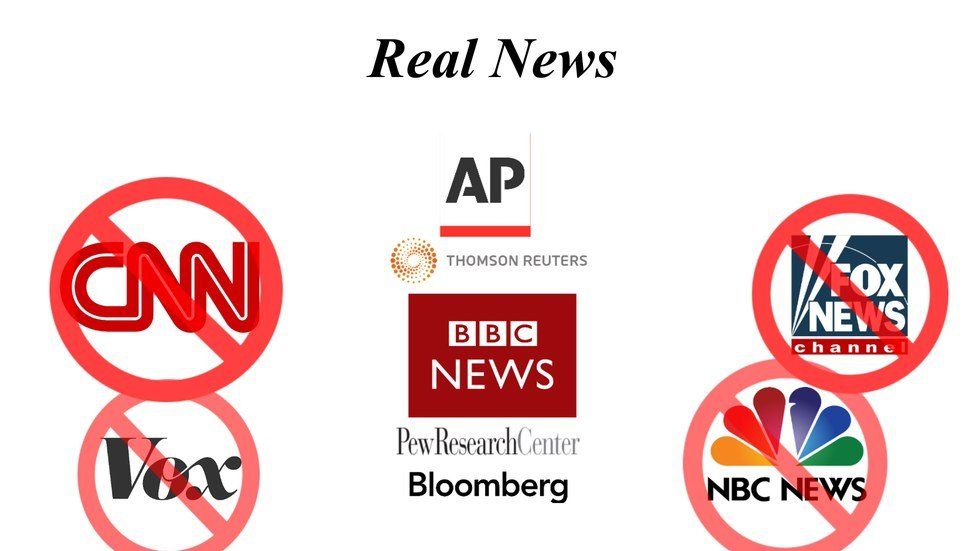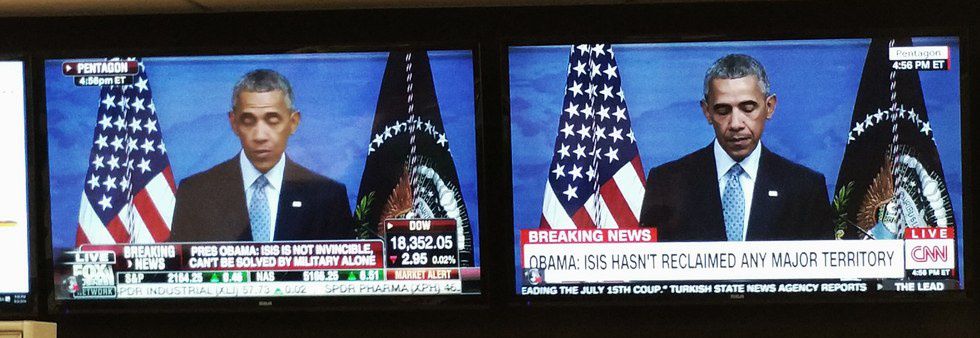Throughout the current political season, there have been many decreeing that modern news outlets are simply untrustworthy. From presidential candidates to many of their supporters, the news media have taken quite a hit. The Pew Research Center reported in 2014 that the top 5 most well-known news sources are CNN, ABC, NBC, CBS and Fox News (in that order). However, the same report found that in 2014, amongst a bipartisan survey, these news sources ranked 9, 6, 8, 7, and 21 respectively among bipartisan trustworthiness. This does not bode well for these news sources, especially considering this survey was conducted before this election season started. Election seasons tend to reveal the true colors of these news agencies. It is clear that many desire a change of news source, and that many distrust the current major news sources. This distrust may simply comes with the scale of said news source. Personally, I can barely watch CNN, Fox News or NBC without wanting to tear my eyes out.
Here we see Fox and CNN contradicting each other in sentiment but not in fact. Whereas both could have simply stated for a headline "Obama Addresses the Nation on ISIS," they both chose not to be so simple, yet without fabrication create two different narratives for their target audience.
So, in an election cycle where everyone is claiming the media is lying and controlling them, what are some alternative news sources to consider?
Here are five news sources that I have fallen in love with in the past few years, news sources that are aimed at professionalism and non-partisanship. For those who also cannot stand the most used news sources, maybe take a look at these.
Disclaimer: These are personal recommendations; this list is not an empirical list of the most factual news sources. Pew Research tried to determine that and concluded such a study is nearly impossible. But I enjoy objectivity, and this list is the best I could do.
5. AP (Associated Press)
Being a wire service, this is one of the two news sources that commonly provides primary sources for other news sources. You will often find that CNN, Fox and others will use the AP in their reports. The AP’s Mission Statement includes “we abhor inaccuracies, carelessness, bias or distortions.” The AP focuses on the major news events, as well as sporting and celebrity news. The AP often gives the same notifications as CNN, but without digestive bias in their articles. The AP often covers press releases and is the first to report on election events due to their incredible coverage capabilities. The app for AP is a little annoying (on Android at least), seeing as when you click on a notification, it doesn’t take you right to the article. The AP’s many notifications per day, as well as its more pop-like articles puts it at number five on my list, but it's definitely one to consider.
4. Pew Research Center
A non-profit, non-partisan organization, the Pew Research Center has become a well-respected source in its 12 years. Their statement of neutrality is not merely a statement. Non-partisanship is organized under the IRS tax code. Meaning that any partisanship from Pew Research is punishable by tax. It’s not a shock Pew Research is included in my list, as I have already used it for this article. Pew statistics have been used by other news sources (Business Insider, CNN, National review, 538, etc.) and are free of use (great for college students). They provide public opinion polling, survey data and social science studies. They recently did a study on the differences in news comprehension from Facebook vs. Twitter, and I recommend checking it out. They provide a weekly emailing letter that is definitely worth it, although an app would be nice. Their attention to detail, depth and statistical nature is necessary for people who want news and tons of information without the digestion or spin.
3. Bloomberg News
My economic go-to source. It started in the 90s as a sort of add-on to Bloomberg L.P’s main product of economic forecasting tools. The news source quickly grew and continues until today amid much stagnation with other news sources. It takes a heavy statistical approach, much like Bloomberg himself applies to his business and governing. There is much jargon and sometimes complex economics being reported, but I learn something new every day. Last April, Bloomberg hosted an interview with all the living heads of the Fed. It focused on the current state of our economy and forecasts on monetary policy, possible use of fiscal policy and fed rate hikes. They also take time to report on political and other news stories (seeing as these do have economic consequences), but only take the time necessary on such news events. Bloomberg News have recently re-defined themselves as “to capture everything that matters in global business and finance. Our job is to expose financiers’ mistakes and vanities, to probe into imperfect markets and to point to potential speculative bubbles." My hope is that economic scale and a dedication to high ratings does not one day ruin Bloomberg. It is notable that Bloomberg ranked 17 on the Pew Research list of bipartisan trusted sources. Interestingly, it was found dishonest amongst conservatives, even though it calls itself the "chronicle"’ of capitalism. However, after 26 years of growth, they’ve decided to further dedicate themselves to economics in the long run, and have gained much respect amongst business professionals.
2. Thomson Reuters
Only recently have Thomson Reuters joined my group of top five news sources, but they’ve quickly risen to the top. Reuters is often used by both FOX and CNN, and even ABC and NBC. They are known for the scale at which they can report the news all around the world, although they came under antitrust review for their size in 2009. Reuters reports on the most important news events and range from economic reports, political polls and surveys and excel in current events reporting. Their use by both left- and right-wing news outlets is a representation of their neutrality. Their mission statement is “Thomson Reuters provides professionals with the intelligence, technology and human expertise they need to find trusted answers.” So far they've lived up to such a statement. Reuters Journalists abide to to the Reuters handbook of journalism to maintain reliability and neutrality. They use a value neutral wording approach, in which they refrain from using the word "terrorist." I hope it does not change amid fears of change after the recent merger of Reuters and Thomson. Again, Reuters is new to my list but has impressed me. Reuters is heavy in information and complexity, though it can seem bland. The detail and amount of research in their articles compensates in space for their lack of spin, yet gives you more information to make informed decisions from. Their app is very well-done; notifications average one a day on only the most important events or studies. Reuters is one anybody should take a look at. With more time, Reuters may become first on my list.
1. BBC News
This was obviously going to be first. It's the news source everyone knows about, everyone agrees is good and nonpartisan (mostly), and yet it is not the one people in the U.S. read. Pew Research found only 17 percent of Americans get their news from BBC. BBC does digest the news a bit at times, but mostly they are information-heavy like the others on this list. They are a state-owned broadcasting channel and have maintained unprecedented respect; Pew finds them as the second most trusted news source among both American political parties (first if one takes size of audience into account). They provide amazing coverage range with a far more global presence than competitors. News stories that CNN only covers for moments, like an attack in Bangladesh, BBC will have much more dedication to. BBC has a great app, a reasonable amount of daily alerts, and a great widget for Android users.
I recommend using all of these in tandem, as their individual range and different information on certain news events can provide and even clearer picture when aggregated. Two are international wire services, one focuses on economics, one is a survey and research site, and the other is an all-around. The last three on the list (Bloomberg, Reuters, BBC) tend to have journalists that move between the three. These are just a handful of sources to consider, but these sources have given me consistently trustworthy journalism.






















